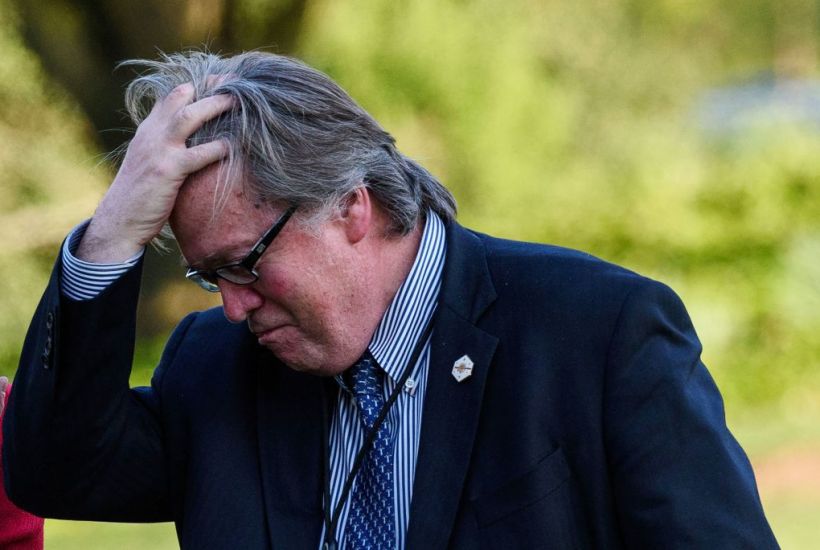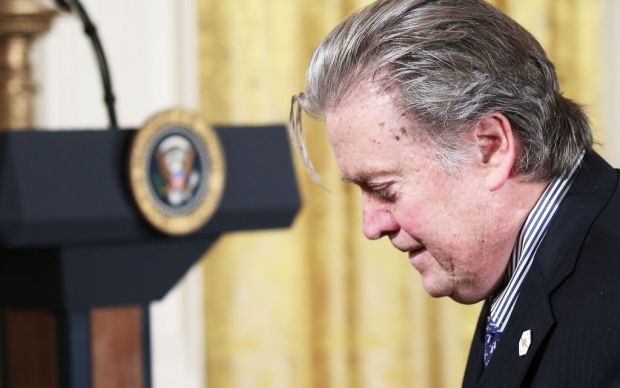At its most coherent, Trumpism has always been a heretical offshoot of Bannonism: the same populist-nationalist spirit without its conservative, Christian foundation.
So there’s really no other way to say it: objectively speaking, with the departure of Bannon, there is no point of continuity between Candidate Trump and President Trump. They’re two completely different people who happen to share the same Twitter handle.
Or, as Bannon himself put it shortly after his departure: ‘The Trump presidency that we fought for, and won, is over.’
This will prove a serious watershed moment in the populist movement. The President’s arch-loyalists – many of whom joined his movement as Bannon-style conservative nationalists – will stand by him regardless of what policies he pursues and who he places in his White House staff. Another segment, though not loyal to Bannon himself, will see his departure as the last blow to the Old Guard. The West Wing, they’ll say, is now controlled by New York liberals: Ivanka, Jared Kushner, Dina Powell, and Gary Cohn.
It won’t, however, be the mass exodus many Trump critics anticipate. It won’t be the straw that breaks the Administration’s back. There’s been a slow leak of prominent defectors from the beginning of this presidency, none of which attended major firings.
Most prominent were Ann Coulter, Milo Yiannopoulos, and Paul Joseph Watson: three of the President’s most ardent media boosters, who ‘got off the Trump Train’ after his attacks on Syria.
That was a make-or-break moment for the President. For all the claims that Trump ‘remade the Republican Party in his image,’ Trump’s political life depended on one of two possibilities: (a) he failed to completely Trumpify the GOP, leaving a sizable contingent of Bush-style interventionists, or (b) he remade the party into a personality cult populated by obedient yes-men.
Both were probably true to some extent, considering Trump’s poll numbers didn’t budge. If there were any anti-interventionist walkouts, they were quickly replaced by ‘establishment’ Republicans who were glad to take their seat on the newly-weaponised Trump Train.
That’s been the case throughout this presidency. Trump is leading a rather charmed political life: he can’t upset his base without pleasantly surprising his #NeverTrump opponents in the GOP.
We shouldn’t discount the yes-men, either. After all, he’s been a pretty good president. The stock market is up. Illegal immigration is down. Millions of jobs are being created. North Korea’s been cowed (at least for now). There’s a case to be made that, whatever his campaign promises, Trump’s adjusting his philosophy to suit the realities of his office. Maybe we can forgive him a bit of ideological impurity if it gets results.
To be clear, I’m not for personality cults. But I’m not surprised many of his supporters are willing to give him the benefit of the doubt.
So, if I were a White House counsellor, I wouldn’t worry about Trump’s re-election prospects… at least not for that reason. What he loses in Bannonites, he makes up for in prodigal establishmentarians. But as a voter and a journalist, I do wonder about the future of the nationalist movement.
Bannon claims he’s ‘leaving the White House and going to war for Trump against his opponents – on Capitol Hill, in the media, and in corporate America.’ As one Redditor put it:
This is kind of like when Admiral Kirk was demoted to Captain Kirk so that he could be unleashed to do what he did best: command a starship.
Which sounds pretty cool, until you ask yourself: ‘If Trump let Bannon go so he could become a more ferocious critic of powerful liberals, does that include those inside the Administration?’ Again, there are two possibilities.
One is that Bannon and Breitbart will start taking pot-shots against the ‘New York faction’ (the Kuchners, Powell, and Cohn). If so, that’s clearly not what Trump intended. If he’s rooting for the nationalists against the New Yorkers, he could’ve fired them and kept Bannon on.
If, however, Trump’s liberal inner circle is getting a free pass, that’s only going to delay such hostilities. Think about it: what happens after Trump? As we said, the actual Trumpist machine is now either ‘establishment’ or out-and-out liberal. Whoever he appoints as his successor, it probably won’t be someone his base would accept on their political vision.
Which means we should expect Trump to give rise to a new political dynasty, much like the Clintons: ideologically tepid but efficient technocrats. Trumpism, like Clintonism, will be defined less by its ideology than its managerial competence – not to mention its managers, Jared Kushner being to Trump what Huma Abedin is to Hillary. And, like the Clintonites themselves, the Trumpists will have influence in the party apparat that vastly outweighs its support among the base.
So, what happens if he appoints (say) Ivanka: someone the Trumpist base has never really liked and certainly never trusted? What happens when the head of the Trump machine is someone to whom the base has absolutely no affection or loyalty – someone that won’t get a free pass for deviating from the nationalist program, the way Trump himself has?
The movement’s best chance for survival is that Bannon turns his guns on the New York faction and forces a purge, reinstalling allies of the Old Guard (Bannon, Priebus and co) Otherwise, if the Trump Administration concludes with such a deep and pronounced ideological divide, there will be civil war – almost certainly one brutal enough to destroy both the Trumpists and the Bannonites.
Got something to add? Join the discussion and comment below.
Got something to add? Join the discussion and comment below.
Get 10 issues for just $10
Subscribe to The Spectator Australia today for the next 10 magazine issues, plus full online access, for just $10.


























Comments
Don't miss out
Join the conversation with other Spectator Australia readers. Subscribe to leave a comment.
SUBSCRIBEAlready a subscriber? Log in